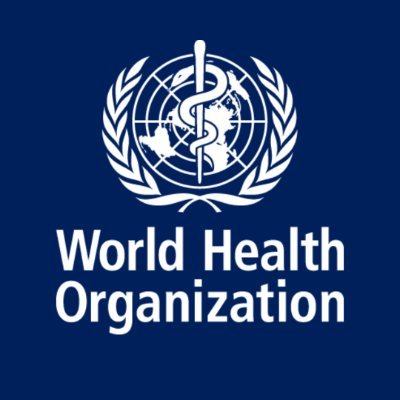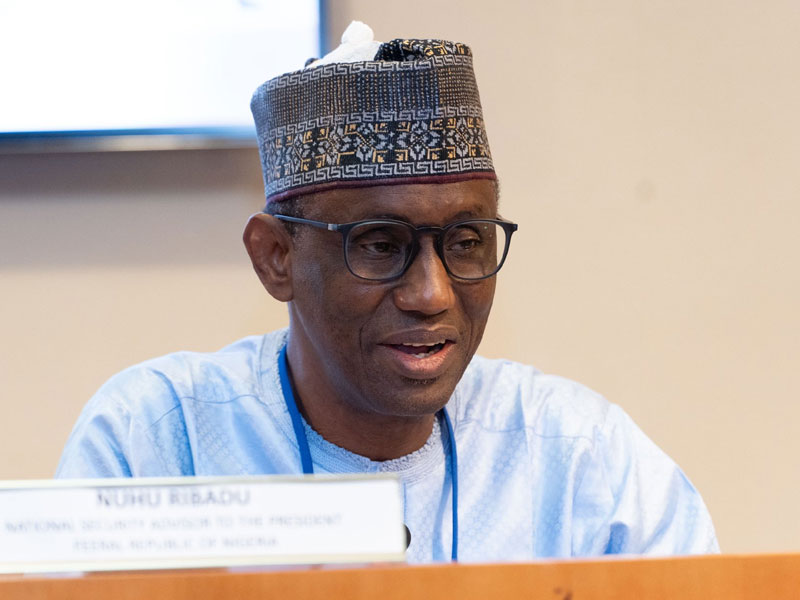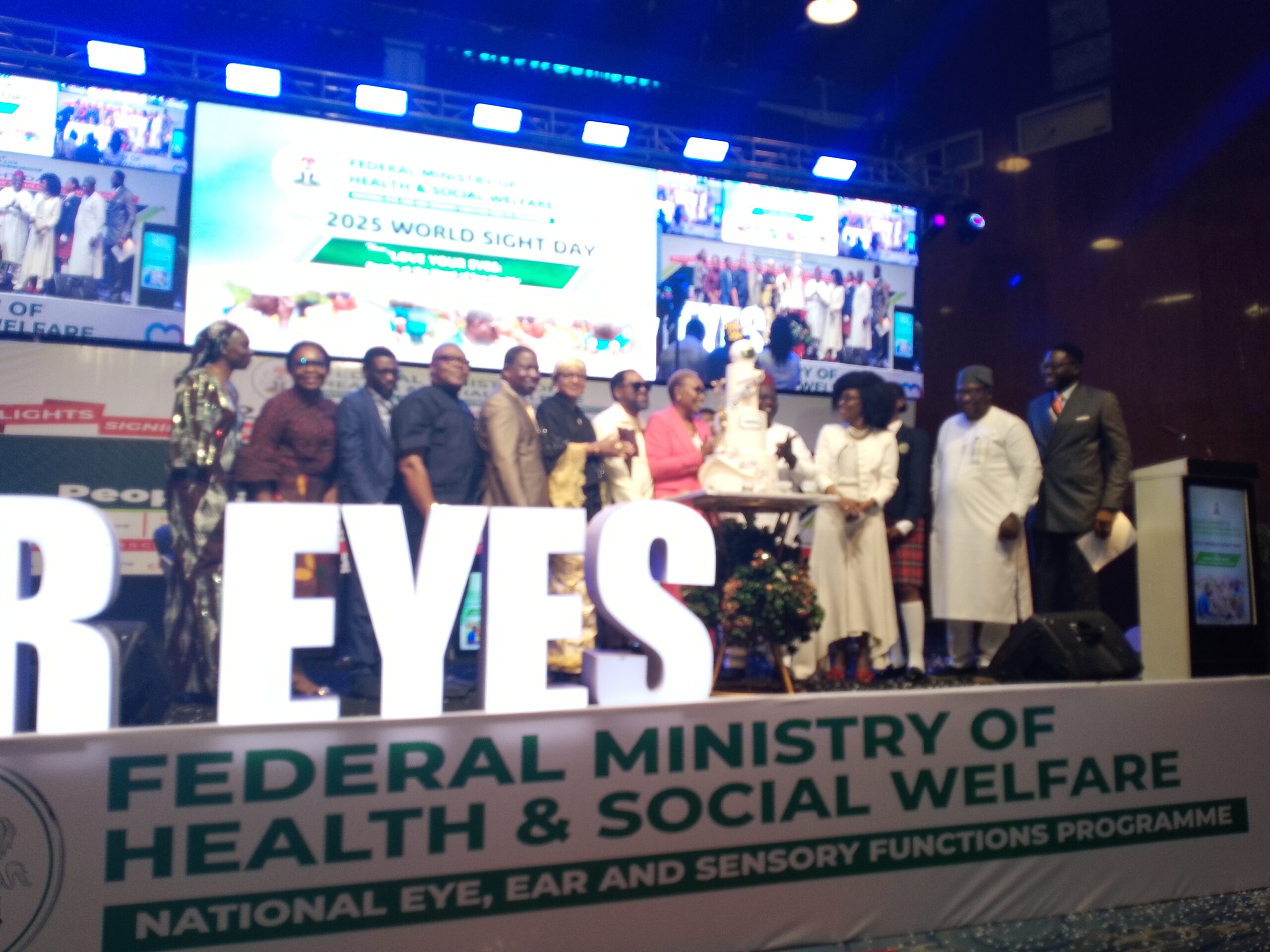
…Moves to Integrate Primary Eye Care into Primary Health System Nationwide
By Fatima Saka
The Federal Government has reiterated that vision plays a crucial role in socio-economic development, emphasizing that eye health is now recognized as a key component of the United Nations Sustainable Development Goals (SDGs).
Minister of State for Health, Dr. Iziaq Adekunle Salako, stated this in Abuja on Thursday during the commemoration of the 2025 World Sight Day, themed “Love Your Eyes.”
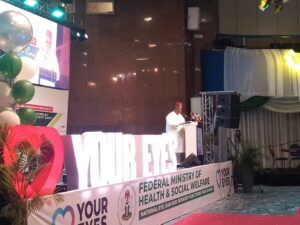
Represented by Dr. Jimoh Olawale Salaudeen, mni, Director of Hospital Services, Dr. Salako reaffirmed the Federal Government’s commitment to preventing avoidable blindness and improving access to quality eye care services across Nigeria through the integration of Primary Eye Care (PEC) into the nation’s Primary Health Care (PHC) system.
“Evidence has shown that individuals with impaired vision have difficulty performing daily tasks, and their productivity declines significantly,” Dr. Salako said. “The prevention of blindness is key to achieving SDG 1, No Poverty, because vision loss costs the world an estimated $411 billion annually.”
He noted that the integration of eye care into the PHC system would make services more accessible to millions of Nigerians, especially those in underserved and rural communities.
According to him, the National Eye Health Policy (2019) and the National Eye Health Strategic Development Plan (2023–2027) provide the framework for scaling up eye care delivery and strengthening Nigeria’s health system toward universal coverage.
Dr. Salako explained that the Federal Ministry of Health has trained 12 master trainers across Nigeria’s six geopolitical zones to support state-level personnel in integrating PEC into PHC. Data collection and reporting tools for PHC facilities have also been developed to enhance monitoring and evaluation.
He said the integration would enable primary health care workers to manage simple eye conditions and refer complex cases appropriately, improving early diagnosis and reducing avoidable vision loss.
On ongoing interventions, the minister announced the rollout of the Effective Spectacle Coverage Initiative Nigeria (ESCIN), also known as Jigibola 2.0, which aims to distribute five million free reading glasses across 15 states within three years. The initiative targets uncorrected refractive errors, particularly presbyopia, a leading cause of visual impairment in older adults.
“By prioritizing eye health today, we are investing in a brighter, more prosperous tomorrow for Nigeria,” he added.
In her welcome address, the Permanent Secretary, Federal Ministry of Health and Social Welfare, Daju Kachollom, represented by Dr. Oteri Okolo Eme, National Coordinator of the National Eye Health Programme, urged Nigerians to prioritize regular eye check-ups and early detection of eye diseases.
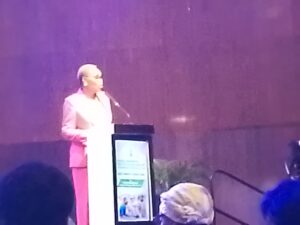
She stressed that eye health is not merely a medical issue but a critical factor in achieving universal health coverage and promoting national development.
“The economic and social implications of vision impairment are enormous, especially for a young and growing population like Nigeria’s,” she said. “We must act now to prevent avoidable blindness and improve quality of life.”
Dr. Oteri Okolo Eme, National Coordinator of the National Eye Health Programme, reaffirmed the Federal Government’s commitment to expanding access to affordable and sustainable eye care services nationwide.
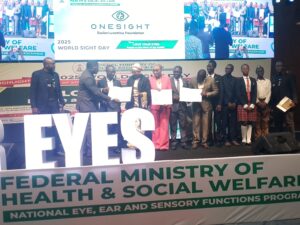
Speaking on the recent Memorandum of Understanding (MoU) between the Federal Ministry of Health and the OneSight EssilorLuxottica Foundation, she said the partnership builds on President Bola Ahmed Tinubu’s commitment to improving eye health and ensuring universal access to spectacles and other vision services.
She recalled that in 2023, the President approved the Effective Spectacle Coverage Initiative, also known as Jigibola 2.0, designed to increase access to quality eye care and affordable glasses through both philanthropic and sustainability models.
“Before this MoU, we had already piloted three vision centres in Lagos, Owo (Ondo State), and Abeokuta (Ogun State),” Dr. Eme said. “These centres are fully equipped with trained personnel providing quality eye care and spectacles at affordable prices.”
She explained that the new partnership will expand these efforts by establishing vision centres in selected secondary health facilities nationwide, ensuring that the system remains self-sustaining beyond donor support.
“Free services are not sustainable forever. What we are building is a long-term structure that allows Nigerians continued access to affordable spectacles,” she said.
Dr. Eme noted that under Jigibola 2.0, more than 1.5 million Nigerians have been screened and 1.2 million free spectacles distributed within a year, with 66% of beneficiaries receiving their first pair of glasses, most of them women.
To ensure sustainability, the programme is being integrated into the primary healthcare system, where trained health workers screen, prescribe, and dispense glasses within communities.
She added that the Ministry is also expanding access to cataract surgeries, with 3,000 free operations planned for rural areas within the next year. Under the Renewed Hope Health Connect Initiative, the government aims to deliver 25,000 free cataract surgeries and reach five million Nigerians with spectacles over the next five years.
Dr. Eme also highlighted other ongoing efforts, including the development of national guidelines and workforce training to manage conditions such as diabetic retinopathy and cataract management.
Speaking on Family iCare, a component of the initiative, she said the programme works with state ministries of health, national orientation agencies, and community health workers to raise awareness and dispel misconceptions about vision loss and aging.
“When we go into communities, we train orientation officers to educate people about refractive errors and to debunk myths that vision loss is inevitable with age. Growing old does not mean going blind,” she emphasized.
She reaffirmed that with strong partnerships, government leadership, and community engagement, Nigeria is on course to achieve universal eye health by 2030.
In her presentation titled “Celebrating the Impact of Partnerships in Putting Patients at the Heart of Eye Health,” Dr. Eme described Nigeria’s progress in eye health as a determined journey “up a mountain once shrouded in mist.”
“Our journey began with modest resources and daunting statistics, but with leadership, partnerships, and donor support, we have scaled steep terrain,” she said. “We now have policy documents and governance structures in 35 states and the FCT, and we hope to achieve full nationwide coverage by next year.”
She noted that the National Eye Health Programme, now expanded to include ear and sensory functions, continues to strengthen advocacy, improve service delivery, and ensure community ownership of interventions.
Among the achievements she listed were:
Dispensing over 1.2 million free pairs of reading glasses under Jigibola 2.0 within one year, with more than half of the beneficiaries being women.
Training 2,200 Primary Health Care workers across 15 states to deliver primary eye care.
Conducting 3,000 free cataract surgeries for Nigerians in riverine communities.
Mustapha A. Njie, the Head of Africa, OneSight EssilorLuxottica Foundation,, reaffirmed the Foundation’s commitment to improving access to affordable and sustainable eye care services in Nigeria through its new partnership with the Federal Ministry of Health.
Njie said the initiative targets the 79 million Nigerians affected by uncorrected vision impairment. “Globally, about 2.7 billion people suffer from uncorrected vision, and 90 percent of them live in developing communities where access remains a major challenge,” Njie noted. “In Africa alone, about 360 million people are affected. That is why this partnership with the Nigerian government is so important.”
He explained that the Foundation’s intervention is guided by the three A’s Affordability, Awareness, and Accessibility, to ensure equitable access to essential eye care.
According to him, the Foundation will work with the Ministry of Health to establish permanent vision centres in selected public hospitals across the country.
“These centres will be equipped with the necessary tools and eyeglasses,” Njie said. “While the Ministry provides the space and human resources, the Foundation will supply equipment and lenses. Those who can afford to pay will do so at a minimal cost, while those who cannot will receive free eyeglasses through our partners.”
He explained that proceeds from the sale of eyeglasses will remain with the Ministry of Health to ensure the financial sustainability of the project after the Foundation hands over full ownership to the government.
Njie described the partnership as a five-year agreement, adding that it marks the beginning of a long-term commitment to eliminating avoidable vision impairment in Nigeria.
READ ALSO: NTEC Coordinator Urges TETFund to Integrate National Talent Hunt into Nigeria Tertiary Institutions
Africa Climate Forum 2025 to Catalyze Green Transition, Sustainable Growth in Nigeria
“We know five years will not solve everything, but it’s a strong start. Our goal is to build a model that can sustain itself and expand in the future,” he said.
Njie commended Dr. Oteri Okolo Eme and her team for their leadership and dedication to making the initiative a success.
“I want to sincerely thank Dr. Oteri and her team for their leadership and commitment to making this project a reality in Nigeria,” he added.



